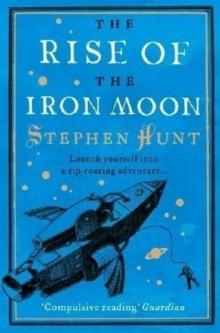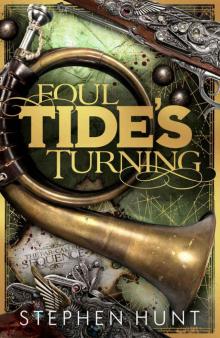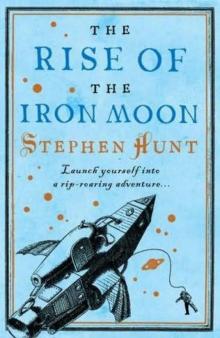- Home
- Stephen Hunt
Jack Cloudie j-5 Page 2
Jack Cloudie j-5 Read online
Page 2
He was a lot stronger now, of course, a titan among men as he imagined it. It had been so much easier when they were younger. While it was true that the life of a freeman’s daughter in the town was little better than that of a slave — always subject to the arbitrary whims of her father — when they had been children so much less had been expected from either of them. There had been time enough for Omar and Shadisa to sneak off to the beaches along the south. Empty golden sands, the two of them climbing palm trees and casting dates down into the sand drifting like mist along the surface where the ocean winds stirred it. Building fires from driftwood and making palaces and castles from sand mounds. Their favourite tree was an old betel palm that had embedded itself along the back of the shoreline, its feathered leaves perfect for hiding them as they waited to ambush other children. In its mottled shade they would sway and discuss who were the bigger tyrants among the great house’s staff and the water farm’s workers, quickest with the switch and harshest with the load of duties. Spending time larking about the sands with Shadisa seemed the most natural thing in the world — the one thing he had to look forward to, the one thing he could count on.
That time seemed so distant now, like remembering a lost age of magic. As they had grown older, he had vowed to let nothing separate them. Certainly not the growing differences in their bodies, swelling in increasingly interesting fashions. The way his heart would jump when she held his hand. The way he would find himself looking for excuses to seek her out, or invent chores to bring her out to the water farm. But as they grew older, so did Omar’s awareness of the relative differences in their position. He was a slave; she was the daughter of a freeman. When they had both scurried around under the threat of the switch as children, that difference had seemed academic, simply a word. Nothing in it. But as adulthood beckoned, with each new season their relationship threatened to widen into an unbridgeable canyon. With the passing of every year, they got closer to the point where Shadisa would be expected to meet no man socially save with the company of a chaperone, and a mere slave, never! Omar knew of Shadisa’s father, a very hard man who never smiled, with a reputation for greed and cheating in his dealings. Eyes as cold as ice, and a dry pockmarked face that seemed as seared as the cruelty of the desert. He had once ordered his wife flogged on the flat roof of his house when she miscarried with a son inside her belly. A punishment for whatever she had done to offend the prophets and cause the loss. He had killed a slave too, in a drunken fit, beating the boy’s head in with a piece of firewood one night. Why? Who knew: just because he could, maybe. And what would he do to me if I dared to present myself as a potential suitor, a lowly slave come calling, and without a dowry to boot?
There had been a brief interlude in the inevitable after a disastrous plague had swept the region, carrying away both Omar and Shadisa’s mothers in the same sickening outbreak: a freeman’s wife and female house slave equalized at last by death’s cold touch. So many had died that the old ways and social codes had briefly tottered. There hadn’t been enough hands to do half the work of the town, let alone bother with the strictures of society. The prices of slaves had tripled, along with the wages of freemen; food had become ever more scarce, with insufficient hands to work the fishing boats or keep the irrigation channels clear of sand. Commercial concerns had gone bankrupt all across the province. With one solitary consolation. The grieving over the loss of their mothers had briefly brought Omar and Shadisa even closer. By then, they were of an age where their presence together would be remarked upon, and the beach had become unsafe as a rendezvous; too much danger of being spied upon by a passing townsperson looking to supplement a barren larder by collecting the last tide’s seaweed.
Reluctantly, Omar had abandoned the familiar fan of their palm tree’s leaves, trading it for an ancient ruin in the desert. There was a place ten minutes’ walk from the town, a failed oasis and its collapsed wellspring. There had been a construction there once, as old as time, now with only seven pillars left to make its presence in the world. Shadisa had called them the ‘Pillars of Nuh’ after an old children’s tale, a little bowl of sand offering the shade of its cracked marble columns to rest in. You couldn’t always find it, as the drifting sands sometimes covered it over, before reversing its passage a few weeks later and revealing the dried up watercourse again. When you were inside it, nobody could find you, not unless they stumbled over the top of the basin by accident.
Omar had missed the sound of the sea lapping against the beach and the cry of the gulls, but along with his advancing years, there were other consolations to capture his attention. Like the way Shadisa would flick and curl her golden hair across her soft smooth skin as she gazed up at the clouds, or bump him playfully when he made her laugh with some boast or sly observation. His mimicry of the cooks, gardeners and water engineers working at the great house had been particularly useful in that regard. She would roll about laughing, her teeth flashing as white as the mysterious arched bones they occasionally found jutting out of the dunes, allowing him to pull her close and taste her lips with his. He hadn’t even needed to arm-wrestle Shadisa to claim his prize.
But in all lives there comes a time when the laughter must end, and for him that had been one evening after they’d been staring up at a sunset together, the hot ancient peace of the desert interrupted by a woman’s wails. He and Shadisa had crawled to the top of the dried-out wellspring to see someone fleeing across the sands, a young woman wearing an ivory scooped-neck abaya, her body weighted down with dozens of leather water bottles. Shadisa recognized her first, whispering her name to Omar. One of the staff at the great house, a raven-haired beauty called Gamila. She had been promised in marriage to a water trader, a man of such exceptional ugliness that it was said none of his other three wives could bear him children. Despite his advanced age, or perhaps because of it, Gamila had been promised to the merchant as a cure for his other wives’ infertility — hardly an attractive fate for one so young and vivacious. And here she was, sprinting across the dunes in the cool of the evening, enough water sloshing about her person to follow the caravan road all the way to the next coastal town.
He had hardly needed to hear the distant shouts of a pursuit to know that she wasn’t travelling with her family’s blessing. Shadisa had made to jump up and signal to Gamila to hide with them under the watercourse’s crags, but Omar has pulled her back. If they were discovered out together, Shadisa wouldn’t have needed Gamila’s presence to condemn her in sharing the errant daughter’s fate. Shadisa had struggled and kicked, but the days when she’d been a physical match for Omar were long gone. With his fingers clamped over Shadisa’s mouth, Gamila sprinted past, following the crescent-shaped mound of a sand dune without spotting the dried-up oasis. Then she was gone, the shouts of the chase growing louder, men’s voices hooting and calling to each other, before passing and fading under the darkening sky.
How Shadisa had cursed and damned him for stopping them going to the girl’s aid. He was a fool and a coward and a timid fraud. She couldn’t believe he could be so selfish. Shadisa simply didn’t see how he’d been protecting her all along, saving her from her own thoughtless, reckless actions. Shadisa’s father’s temper would have been volcanic if she had been discovered out in the dunes with a male slave, aiding a girl in dishonouring her family’s name. Gamila had called her own fate down upon her; every slave knew there was only one crime worse than running from your master, and that was getting caught in the attempt. Shadisa didn’t deserve to join the careless house girl in her punishment, and frankly, although he had never voiced it, neither did Omar.
And a wantonly cruel punishment it proved to be. After Gamila had been dragged back to town, the old merchant quickly decided to break off their betrothal in favour of one of Gamila’s younger sisters. Her family then paid for a master womb mage — an expert in the honour-sanctions demanded by wealthy families — to travel to the town from the distant capital. The spurned suitor rejected the lighter punishment of giving Gamil
a two extra arms and sentencing her to a life of hard labour as a baggage carrier. Instead, the womb mage had buried her in the sand up to her waist on the outskirts of town and inflicted a changeling virus on Gamila, twisting and mutating her form into a cactus-like taproot. What had been her arms and head warped into fleshy green pads, the outline of her face barely visible as lumpy veins of spines. No eyes to see, no mouth to scream; Omar had often prayed there wasn’t enough sentience inside her barrel-like trunk to feel the cuts of travellers’ knives as they sliced wedges out of her body and sucked on the rubbery green flesh for her water. The desert wastes nothing, the travellers would mouth, before discarding the sucked-out flesh in the dust and continuing on their way.
But more than Gamila’s body had changed that day. Ever since then, Shadisa’s attitude towards Omar had cooled. No more walks. No more time together in the old oasis or on the beach. She barely smiled when he approached, and made every excuse to be out of his presence as quickly as possible. Perhaps she was frightened of receiving a similar punishment from her father; perhaps she had seen the price of flouting society’s rules and judged the potential cost of continuing to see Omar too high? Surely she still can’t blame me for what happened to Gamila? It was hardly my fault. You would think that given the time we’ve spent apart, on reflection, she could now see that it is only my quick thinking that saved her. Show me a little gratitude at least. The town’s hunters wouldn’t have just given up looking for Gamila. They would have kept on searching until they found her alongside us, and there wouldn’t now be one body twisted to serve as a taproot outside the town, but three. No, Shadisa’s scared, that has to be it. She’s seen what happens to those who defy their family and she’s fearful. Shadisa just had to be brought to see the greatness burning within her suitor, the infinite potential, then she’d realize that he wouldn’t always be fetching and carrying on a water farm.
‘Hey there,’ ordered Alim, flicking a pebble of limestone rock at Omar, ‘stop mooning over girls too fine for you and open the locks to the next tank. If the fish don’t purge soon, you’ll have a tank of spoiled water and a school of sick salt-fish.’
Omar nodded and made his way to the lock wheels. The last slave who’d killed a batch of salt-fish had been made to eat the sickening black things for a week and almost died of salt poisoning. Yes, the arbitrary punishments, just another perk of being a slave in Cassarabia. Alim helped the young slave in his task, walking down the line of water tanks, twisting the rusting wheels that opened the lock doors, the sloshing water sweeping the fish away to the next stage of the filtering process. The fish were biologicks, of course: the product of womb mage sorcery. Only the House of Barir and the other houses that worshipped the Sect of Ackron, all members of the guild of water farmers, understood exactly how to create and nurture the salt-fish. Adding special vials of hormones to the water supply through their complex life cycle to keep them thrashing and thriving.
Ackron was the fifty-third sect of the Holy Cent, informally known as the trader’s face, and those who embraced the sect often prospered as traders and merchants. That was the theory, at least. The rusting wheels on the water farm’s tanks spoke of a different reality, though. When the plague had spread through the northern provinces of Cassarabia, it had killed over two-thirds of the House of Barir’s people, leaving their coastal water farms undermanned and in the care of the house’s slaves and vagabonds-for-hire like Alim. The bones of the house’s faded glory were laid out in the sand dunes alongside the farm, a handful of metal arches that had been constructed to hold a water pipeline which had never been completed; pipes for fresh drinking water that should have reached all the way to Cassarabia’s capital, bypassing the water traders and the caravans.
It was through the broken arches of the house’s half-finished pipeline that Omar noticed the first visitor rising out of the baking sands, the dark silhouette of a scout atop a saddle raising a long spindly rifle in friendly greeting as the chattering of the sandpedes’ bony legs grew louder in the distance. The insect-like creatures that made up most of the caravan came slithering out of the desert with the dazzling white enamel of thousands of water butts tied to their segmented bodies, flashing towards the water farm.
‘Not good,’ murmured Alim.
‘They are early, old master,’ said Omar, watching the line of water traders coming down the dunes towards them, ‘but so are we. We have enough tanks to fill all their butts. The salt is counted and bagged.’
‘It was I that bagged most of the salt, Omar Ibn Barir,’ spat the old nomad. ‘It is not the traders I talk of. Look …’
Omar shielded his eyes from the sun and turned his gaze to where Alim was pointing. By the silver gates of heaven, the old nomad still had the keen sight from his desert days. There was a keeper on the dune line — one of the respected priests of the hundred sects — riding a camel, breaking away from the main caravan and threading his way through the pump heads that brought sea water up from the harbour. He was bearing straight for the great fortified house overlooking Haffa’s harbour — Master Barir’s residence, as well as that of the beautiful Shadisa, of course. Her olive skin, golden hair and wide green eyes be blessed.
‘It’s just a keeper,’ said Omar. The priests of the Sect of Ackron are always coming and going. The tithes from the House of Barir were important to the sect, and the holy men that received them no doubt said many prayers for the soul of Marid Barir and his profitable water farms.
Alim rubbed the stubble on his old chin. ‘Just a keeper? Have you no eyes to see with, young pup? Look at the green edging around the number fifty-three on his headdress. It is the high keeper of the Sect of Ackron himself.’
An emir of the church, one of the hundred keepers of the Holy Cent of the one true god! What business could he have so far beyond the capital’s comforts? There were no politics here, no court, no temples of note. Just the margins of the desert, a sea breeze, a distant fishing town and the house’s many water farms.
Omar ran a hand through his dark, slightly curly hair. ‘Clearly, my eyes are as perfect as the rest of me. Are you sure it is the high keeper?’
‘Yes,’ sighed the old nomad. ‘I am sure.’
‘He probably wants more money.’
‘Keepers are sent to demand extra tithes from their flock,’ said Alim. ‘Not the high keeper himself. This is bad. In a strong wind, an innocent man’s tiles are blown off a roof the same as the wicked’s.’
‘Is that one of the sayings of the witch that used to travel with your clan?’
‘It is but common sense,’ snapped Alim. ‘Even a town-born slave may drink from that well.’
Omar shrugged and went back to opening the rest of the salt-fish locks, leaving the old nomad to mull over his concerns. Yes, that was the only good thing about being a slave. When you had nothing to lose or hope for, you had little to fear. Worries only came, it seemed, when you had property and status to lose; as a slave, there would be a worker-sized dish of food on his table this evening — because when you owned a beast of burden, it made good sense to feed it and keep it working. And if I am lucky, tomorrow morning might even bring a glimpse of Shadisa’s heart-stopping face. Yes, something will come along for me. Fate will surely accommodate the wittiest and most handsome slave in the empire.
Omar began to hum one of the wild nomad ballads that Alim had taught him.
If he had known what the evening was to bring, he might have changed his tune.
CHAPTER THREE
Jack stumbled to the rail at the front of the stand, his feet constrained by heavy irons and manacles. This was his first time in the middle-court of the Jackelian legal system — his first time in any court for that matter. But even given his lack of experience with such matters, the crowd of illustrators and journalists sitting scribbling away in the public gallery seemed unusually large to his eye. Perhaps if Jack’s father had still been alive, he might have been able to offer some advice — he must have stood in a courtroom like this whe
n the terms of the family’s bankruptcy had been read out. Although perhaps not one so crowded. What was debtors’ prison — the everyday ruin of a common family — compared to the greatest robbery that the capital had nearly seen? And one attempted by the forgotten scrapings of its gutters.
‘The undeserving poor …’ pontificated the judge from his high wooden plinth. A light mist of dust fell from his elaborate wig to be sucked into the pneumatic tubes below where the clerks were sending and receiving reports in between tapping away on the keys of their punch-card writers.
There was a chorus of clanking chains behind Jack as the other members of the gang were pushed to the rail, the public and the newssheet illustrators getting their first look at the felons on trial. The newspapers had no doubt paid a good few pennies to the court officials to ensure that Boyd’s crew would stand there long enough for them to make the drawings that would adorn the late editions of the day’s newssheets.
‘Moral degeneracy …’ the judge growled.
Jack glanced around for their lawyer, who strode forward towards the advocates’ bench. It didn’t look as if things had gone well for the gang in the main hearing. The one Jack hadn’t been allowed to attend while the learned silks argued back and forth, in case the felons’ pauper-like appearance prejudiced the jury. Too many women whose delicate sympathies might have been aroused if they’d been allowed to see the fresh cheeks of the young pickpockets and street thieves who were hauled up in front of the capital’s courts.

 The Rise of the Iron Moon
The Rise of the Iron Moon Empty Between the Stars (The Songs of Old Sol Book 1)
Empty Between the Stars (The Songs of Old Sol Book 1) From the Deep of the Dark
From the Deep of the Dark Foul Tide's Turning
Foul Tide's Turning Transference Station
Transference Station Secrets of the Fire Sea j-4
Secrets of the Fire Sea j-4 Void All The Way Down: The Sliding Void Omnibus
Void All The Way Down: The Sliding Void Omnibus The Kingdom Beyond the Waves j-2
The Kingdom Beyond the Waves j-2 From the Deep of the Dark j-6
From the Deep of the Dark j-6 The Court of the Air
The Court of the Air The Court of the Air j-1
The Court of the Air j-1 The rise of the Iron Moon j-3
The rise of the Iron Moon j-3 Jack Cloudie j-5
Jack Cloudie j-5 The Kingdom Beyond the Waves
The Kingdom Beyond the Waves The Stealers' War
The Stealers' War In Dark Service
In Dark Service